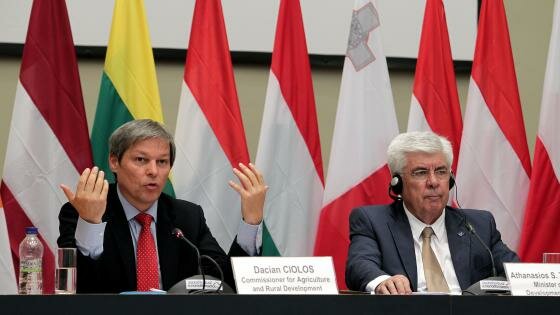- AGRIAgriculture & Fisheries (AGRI)
«AGRIdiversity»: the diversity of European agriculture at the heart of EU policies (Athens 4-6 May 2014)
The informal meeting of EU ministers of Agriculture took place in Athens from 4 to 6 of May, chaired by the Greek Minister of Rural Development and Food Mr Athanasios Tsaftaris. The key issue of the agenda was “Transforming the European agricultural diversity into strength”.
The Greek Presidency has chosen this specific topic with the goal to further turn the European diversity into strength.
Diversity covers all aspects from the capacity of production to the environmental and social-economic conditions of European member states and regions, while the implementation of the new Common Agricultural Policy (CAP) for the period 2014-2020 is based on the recognition of the wide diversification of agriculture across the EU.
The ministers had the opportunity to discuss the importance of the European agricultural diversity for the long-term development of economy, society and environment and also to exchange views on the ways the EU agricultural diversity can become an asset for European farmers and European economy in the current global context.
EU ministers also underlined the importance of needs and expectations of all sectors along the food chain with a view to food security, competitiveness, sustainability, cultural heritage and territorial development. Diversity of products and farming models across countries and regions are a key feature of the European agricultural model and at the same time a distinctive characteristic vis-à-vis the EU’s trading partners. Preserving agricultural diversity is fundamental to long-term sustainable economic, social and environmental development.
Moreover, the ministers stressed out that agricultural diversity contributes to improved food security and competitiveness, in particular for successful adaptation to a constantly changing environment and climate.
It was also stressed that CAP should be mobilized to preserve this diversity and transform it into strength. More specifically, the flexibility offered by the new policy framework can be used by the member states to make the most out of their potential to strengthen agricultural diversity. In this context, ministers agreed that the new CAP offers several tools for the young people to be involved in farming activities in rural areas, for the development of innovation in the agricultural sector, for agricultural research, for the development of the producers organizations etc. Additionally, there are various initiatives and tools to be used, such as promotion measures and new Rural Development Programmes.
The Greek Presidency pointed out the importance of incorporating the results of the discussions to the implementation of the new CAP and to other policy measures as well.








